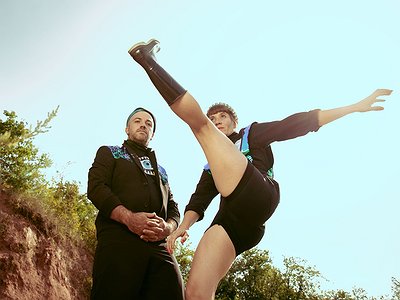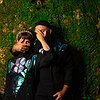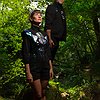Name: Sages Comme Des Sauvages
Members: Ava Carrère, Ismael Colombani
Interviewee: Ava Carrère
Nationality: French
Current Release: Sages Comme Des Sauvages's new single "Le Loyer" is out via Capitane. Full-length album Maison Maquis will follow May 17th 2024 via Capitane and Rising Bird.
Recommendations:
Ava: In Defense of Barbarism: Non-Whites Against the Empire, by Louisa Yousfi (english translation coming in January 2025 at Verso Books)
Ismaël: One Piece by Eichiro Oda
If you enjoyed this Sages Comme Des Sauvages interview and would like to stay up to date with the band and their music, visit their official homepage. The duo are also on Instagram, and Soundcloud.
Where does the impulse to create something come from for you? What role do often-quoted sources of inspiration like dreams, other forms of art, personal relationships, politics etc play?
We are both concerned about what happens to us and others around us (people we know and people we don’t know).
Most songs in the world are about love, losing love, finding love, looking for love, hurting for love. We don’t write about that as we are an “old” couple with a kid and a common career. We write about everything else. We are very concerned about politics, civil rights, colonialism, as much as friendship, mental health, nature, family, deaths, births.
People often tell us how much a song of ours has helped them get through rough times (mourning, confinement, solitude, sickness). We are grateful to see our songs find a way into people’s homes. Historically, songs were written to get through the day and if we can get through ours while helping others get through theirs, bingo! We are very cautious not to despair people, but we try to keep that little light of mutiny burning.
For you to get started, do there need to be concrete ideas – or what some have called a 'visualisation' of the finished work? What does the balance between planning and chance look like for you?
We work very differently but I think none of us has a visualisation of the finished work. We like to be surprised as we go.
Ismaël and I had been playing music for a while before this band forced itself on us. We didn’t plan anything, we didn’t want to play in the same band, two singers in the same house, in the same bed and on the same stage, what a folly!
But the band has its own life and does what it wants. It became greater than anything we did before so now we trust it and let it lead our lives.
Is there a preparation phase for your process? Do you require your tools to be laid out in a particular way, for example, do you need to do 'research' or create 'early versions'?
I do a lot of research. I find a topic and I dive into it, in an almost academic way. Very slowly. I am keen on vocabulary and wordplay, they help me think.
Ismaël has a more musical approach, he will find a riff that will call words he will later shape.
It’s quite amazing to witness, it starts with mumbling and ends up with powerful lyrics. He writes songs like a carpenter carves wood, roughly first and then more precisely. I write lyrics like a racoon steals cat food. I run and fetch and gather in a rather nervous way.
Do you have certain rituals to get you into the right mindset for creating? What role do certain foods or stimulants like coffee, lighting, scents, exercise or reading poetry play?
Ismaël is a night owl. He likes to create in the dark. I’m a coffee addict which isn’t very original. We both are inspired by motion, may it be a long walk or a drive. We both exercise, Ismaël boxes and I play football. We need heavy sports to calm our fiery heads.
But basically we don’t need much. I’m often very inspired anytime after a conversation with our 4 year-old. He’s helped us finish some lyrics more than once.
What do you start with? And, to quote a question by the great Bruce Duffie: When you come up with a musical idea, have you created the idea or have you discovered the idea?
Ismaël starts with his instrument and I have toplines popping out of nowhere.
To answer your quote with another quote, the film director Jean-Luc Godard once said if you think you have an idea you just forgot who you’ve stolen it from. We don’t believe in ideas, it’s all about how you convey them.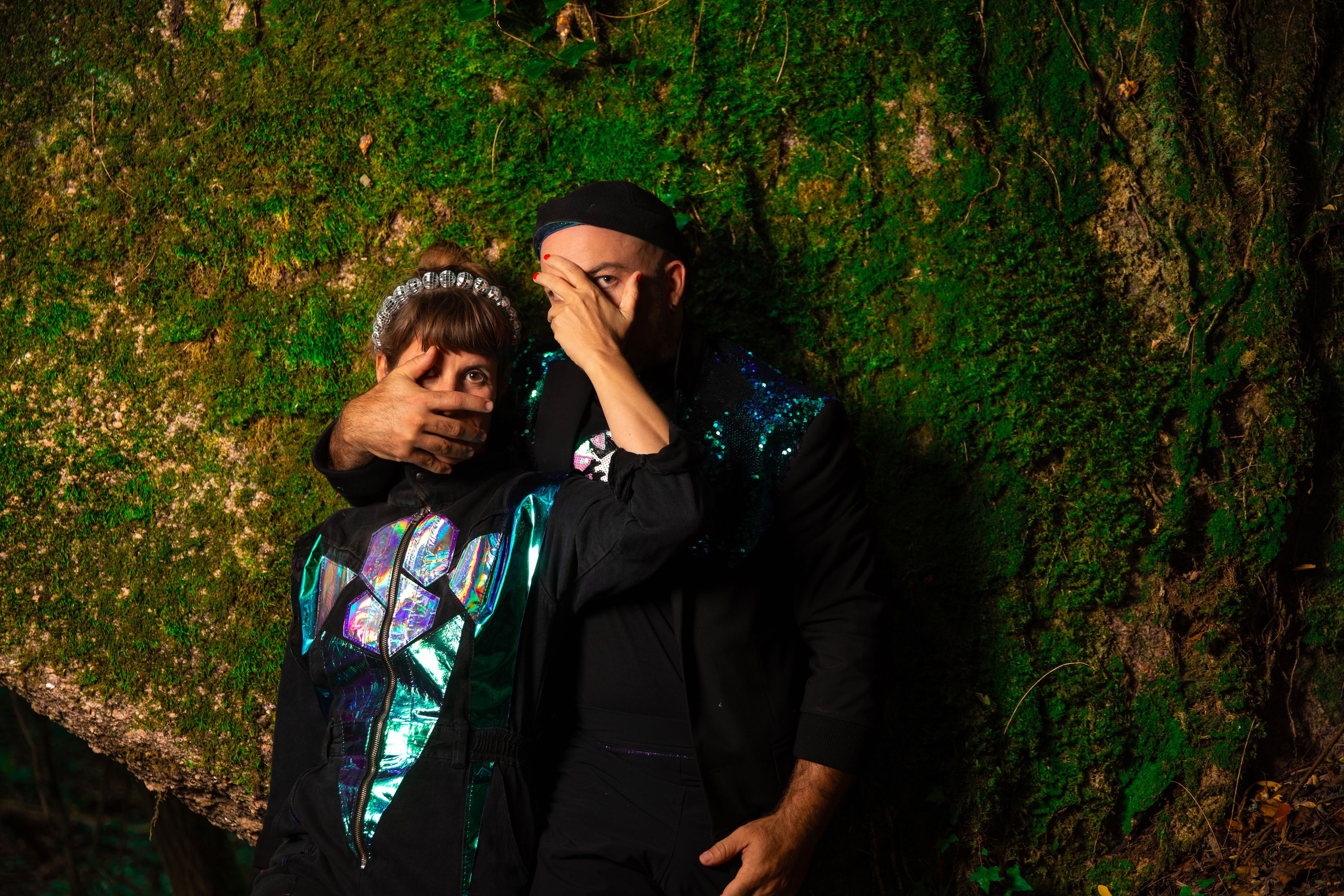
Sages Comme Des Sauvages Interview Image (c) the artists
When do the lyrics enter the picture? Where do they come from? Do lyrics need to grow together with the music or can they emerge from a place of their own?
I am very literary but when words come, they arrive with their own music, playful and in major. I am self-taught so often I don’t know what I’m doing, sometimes I wonder if I really care to know. I grew up in Greece, so when I come up with a songline, Ismaël counts and smiles because it’s often in 5 or 7 beats.
Ismaël has acquired a quite complete musical background, he started violin when he was 6 and at 16 he was the youngest member of a demanding independent rock band that toured all through Europe.
When he was 20 he went to study with Subramaniam, India’s violin icon. Realizing he would never be as good as his master, he decided to start singing but kept playing many instruments.
What makes lyrics good in your opinion? What are your own ambitions and challenges in this regard?
We both believe that what makes good lyrics is a sense of surprise. Also a tension between intimacy and universal is good. We like to write about topics that are related to sociology, politics, economics but we try not to push at open doors.
When we write about something we try to write something we’ve never heard before, hoping if we surprise ourselves we might surprise others.
Many writers have claimed that as soon as they enter into the process, certain aspects of the narrative are out of their hands. Do you like to keep strict control or is there a sense of following things where they lead you?
I am an anti-control freak, I love to leave the keys on the car. I enjoy it when sometimes, years after I wrote a song, I discover a new meaning inside it.
Ismaël is very demanding about his writing which can be much more abstract than mine. This abstraction is welcoming for people to be involved. His lyrics are sometimes surprisingly visionary. Probably for the same reason, they are timeless canvases onto which one can project present time. (sorry not so sure about that sentence).
The funny thing is, at the end of the day, his songs have a strong impact on young romantic souls and mine on children.
Often, while writing, new ideas and alternative roads will open themselves up, pulling and pushing the creator in a different direction. Does this happen to you, too, and how do you deal with it? What do you do with these ideas?
Sometimes Ismaël takes a blurb of mine and inserts it inside one of his songs.
We discuss our writing a lot. Lots of compromise. He tends to complexify my writing and I tend to simplify his.
There are many descriptions of the creative state. How would you describe it for you personally? Is there an element of spirituality to what you do?
I think music is our spirituality. There are rituals, like concerts where we commune, recollection when we rehearse or compose.
A regular back and forth between inner self and collectivity.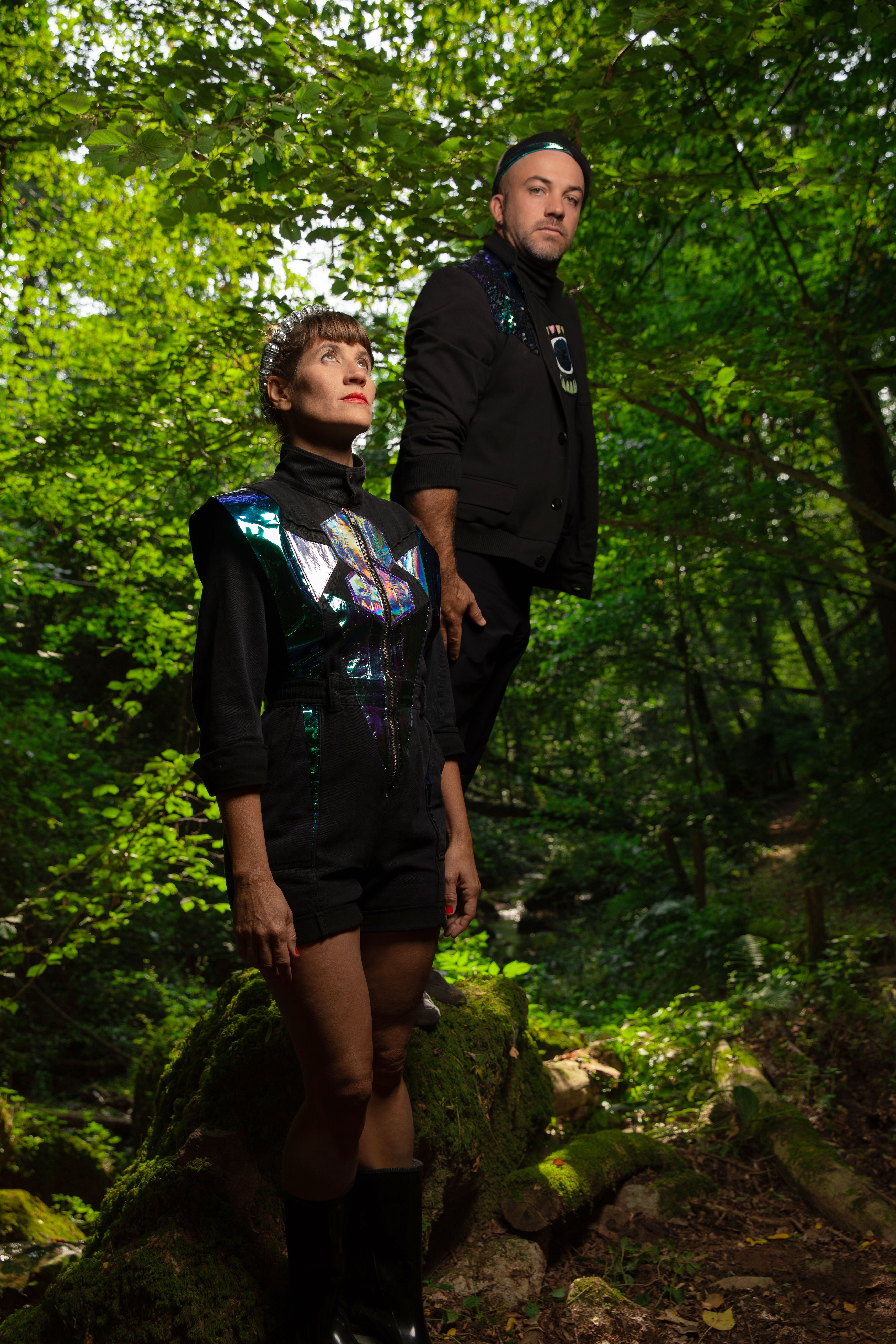
Sages Comme Des Sauvages Interview Image (c) the artists
When you're in the studio to record a piece, how important is the actual performance and the moment of performing the song still in an age where so much can be “done and fixed in post?“
We usually rehearse a lot before going in the studio. We sing in harmony and the pitch must be as good as possible, especially since we favor complex harmonies. Also, we try to create a third voice by blending our two voices together, so in order to let this 3d voice appear, we need to be as precise in our delivery as possible.
We often know what we want and when we get it we’re happy and move on to the next one. Usually the major part of the work lies within preparation more than recording.
Even recording a solo song is usually a collaborative process. Tell me about the importance of trust between the participants, personal relationships between musicians and engineers and the freedom to perform and try things – rather than gear, technique or “chops” - for creating a great song.
As much as we prepare what we do, we love surprises.
When we musically trust someone (a technician or a musician), we usually let them quite free with suggestions, even last minute ones (if it’s quick and efficient because studio is expensive).
What's your take on the role and importance of production, including mixing and mastering for you personally? In terms of what they contribute to a song, what is the balance between the composition and the arrangement (performance)?
Whew, a lot of questions in this one … Ismaël does most of the production and arrangements, I have strong opinions but he does all the research.
The third album was mainly produced by Ismaël at home and then we did something we never did before, we handed the songs that were already quite produced, to another producer. It took a little time to adjust but when he sent us the first song he worked on we were flabbergasted. He really got our tunes and magnified them, he’s a very good drummer and he added weight and depth to our music. His name is Nicolas Da Cunha and he is a member of the excellent Franco-Congolese duet Tschegue. It was exciting to be so surprised with his work on our songs. We enjoyed working with him, a real music making crush.
As for mixing, we always work with someone different, and everytime is a lovely story to tell but I think we need another questionary for that! We pretty much know what sound we want but we also decide to trust the sound engineer sometimes.
The funny thing is, although I’m self-taught, I have a what Ismaël calls a “mastering” ear. I have hyperacusis and it helps me spot some anomalies. Sometimes it’s useful and sometimes it’s not.
After finishing a piece or album and releasing something into the world, there can be a sense of emptiness. Can you relate to this – and how do you return to the state of creativity after experiencing it?
We don’t really relate to this because after finishing the album comes the fabrication process in which we are involved with our structure. The promotion, videoclips and mostly the live version.
We usually tour for 2 or 3 years with an album so it keeps us very busy. And translating a record into a live performance is a whole new work.
Music is a language, but like any language, it can lead to misunderstandings. In which way has your own work – or perhaps the work of artists you like or admire - been misunderstood? How do you deal with this?
There is a main misunderstandings with our music abroad.
First, our name which has had us banned from Québec. Sages comme des sauvages is a pun in French. It is a variation of a saying: Tamed as a picture (sage comme une image) which means well behaved. By replacing image with sauvage, we created an oxymoron that can be translated as “wise like the wilder.” But in Québec, sauvage is a very offensive word to call the Indigenous People in Canada. So we can’t play there. We would love to clear the air and explain the misunderstanding but we’re afraid it’s impossible. Too much harm has been done by settlers, the consequences of colonialism and capitalism still keeps on crushing the land and the people.
What we mean by our name, is first of all a wordplay that states that we will play with language. Secondly, the tension between “wise”, or “tamed” and “sauvage” is more related to us, to my autodidacticism and Ismaël’s knowledge and the tension between them. And of course, it’s about the wrong that can be caused by those who think they know better and the ravages caused by colonialism.
So, yes it is a huge misunderstanding but we get it if we have to pay the price for what’s happened before.
Creativity can reach many different corners of our lives. Do you personally feel as though writing a piece of music is inherently different from something like making a great cup of coffee? What do you express through music that you couldn't or wouldn't in more 'mundane' tasks?
We love the fact that the same song can touch a child and an elderly educated person and an uneducated person.
Our audience is of very varying ages. How cool is that? Better than coffee ! More like a great dish (Ismaël is an excellent cook btw).



